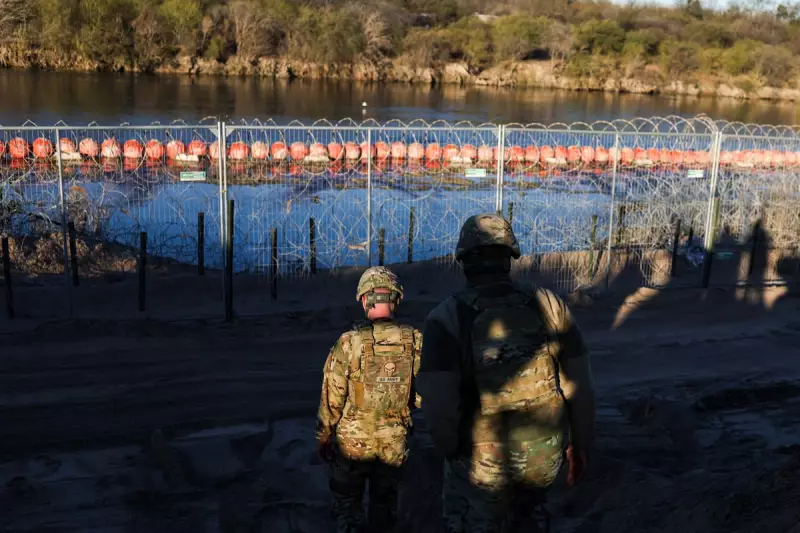
Border Community's Political Shift Faces Reality Check
In the Texas border town of Eagle Pass, where the Rio Grande separates the United States from Mexico, a remarkable political transformation occurred in 2024. For the first time in a century, the Hispanic-majority Maverick County voted for a Republican presidential candidate, delivering 59% of its votes to Donald Trump—a 14% increase from his 2020 performance.
The community, which had become the epicentre of record migration during the Biden administration, overwhelmingly supported Trump's promises to secure the border. Yet one year into his administration, some residents are experiencing growing discomfort with the methods being employed to fulfil those promises.
Frontline Perspectives on Changing Border Dynamics
Manuel Mello III, chief of the Eagle Pass fire department with 33 years of service, has witnessed the border's evolution firsthand. He recalls his grandmother regularly providing food, water, and blessings to migrants passing through—a tradition reflecting the area's long history with border crossings.
During the peak of the migration crisis in late 2023, Mello's department faced an unprecedented situation. "We would get between 30 to 60 emergency calls a day about migrants crossing the river with a lot of injuries, some with broken femurs or this lady who had an emergency childbirth," Mello recounted. Throughout 2024, his department responded to more than 400 emergency calls and reported eight drownings.
The statistics show a dramatic shift under the new administration. Border patrol recorded over 2,300 daily crossings in the Del Rio sector (which includes Eagle Pass) during December 2023. By September 2025, that number had plummeted to just 30 crossings per day. The fire department has responded to fewer than 100 calls this year with only three drownings reported.
Yet Mello remains cautious about declaring victory. "Now Eagle Pass has gone back to normal, but this is still a broken system. Because you're deporting people doesn't mean that you're fixing it," he observed.
Community Reflections on Political Choices
At a local McDonald's where Ricardo Lopez and his friends gather weekly, the 79-year-old former city council candidate reflected on the town's political shift. The bilingual men of Mexican descent discussed how Eagle Pass has changed since the election.
"I think most people that live here can agree that it was the illegal immigration that was causing all the problems and that Joe Biden didn't respond to the needs of the border," said Lopez. "After the last election I asked some of my friends, why did you vote for Trump? And they put it back to me: don't you see what is happening? Though I don't like the guy, he fixed the problem."
Trump moved swiftly after taking office, signing an order declaring a national emergency that deployed additional troops to the southern border. The administration also terminated the CBP One mobile app created under Biden, which had allowed tens of thousands of asylum seekers to cross legally from Mexico.
Environmental and Community Concerns Emerge
While migration numbers have decreased significantly, new concerns have surfaced about the environmental impact and tactics of the border crackdown. Texas Governor Greg Abbott's Operation Lone Star initiative saw the construction of an 80-acre base camp in Eagle Pass to house 1,800 National Guard soldiers.
The operation involved installing floating buoys with saw-blades in the Rio Grande and placing razor wire along the riverbanks. Texas authorities claim the initiative has led to more than 500,000 apprehensions of undocumented people.
Jessie Fuentes, owner of a local kayaking company, filed a lawsuit to stop the floating barriers. "The river was part of my grandfather's upbringing, my father's upbringing and mine, more than 200 years of experience as a family, and now it's been mistreated with this militarization," Fuentes explained. "The river can't defend itself so I sued the Texas government."
According to Joshua Blank, research director of the Texas Politics Project at the University of Texas at Austin, Maverick County's political shift reflects broader trends. "Texas is a changing competitive landscape and more diverse than the country as a whole. If you try to appeal to Hispanics based on their Hispanicness, you might be missing the mark," Blank noted, suggesting Democrats have failed to adequately engage with this demographic.
As armed National Guard troops continue to patrol atop shipping containers along the riverbank, and with no migrants currently visible crossing from Piedras Negras, Eagle Pass residents find themselves balancing appreciation for reduced border chaos against concerns about the methods achieving those results.





